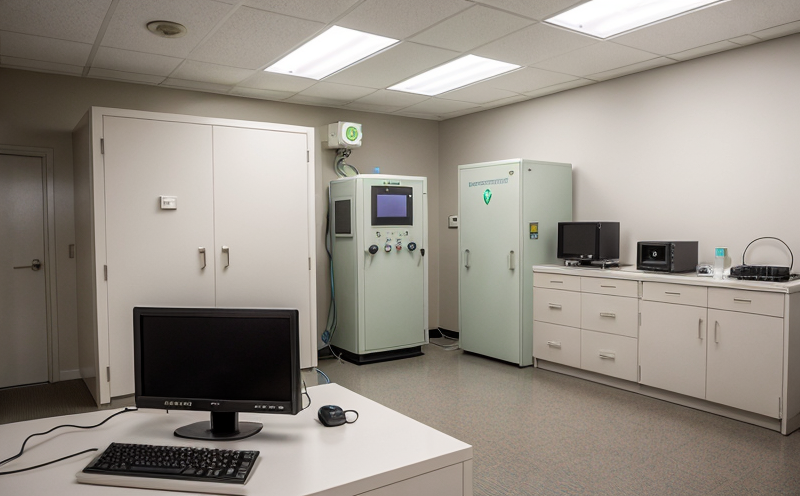ASTM E668 Dosimeter Stability and Accuracy Verification
The ASTM E668 standard practice provides a framework to ensure that radiation dosimeters are stable and accurate, which is critical for applications in nuclear power plants, research reactors, medical facilities, and any setting where personnel or equipment may be exposed to ionizing radiation. This service focuses on verifying the stability and accuracy of dosimeters using ASTM E668 methods.
The ASTM E668 standard defines a series of tests that aim to ensure the reliability of dosimeters over time and under varying conditions. These tests are essential for maintaining the integrity of health and safety standards in radiation environments. By adhering to this protocol, we can provide clients with confidence that their dosimeters meet international quality requirements.
In nuclear power plants, for instance, accurate dosimetry is paramount. Dosimeters used in such settings must withstand harsh conditions, including high levels of radiation and temperature fluctuations. Our service ensures that these devices remain reliable throughout their operational life, thereby minimizing the risk to personnel and equipment.
For medical facilities, especially those involved in radiotherapy or nuclear medicine, dosimeter stability is vital for delivering precise treatments while protecting patients from overexposure. By verifying dosimeter performance according to ASTM E668, we help maintain the highest levels of patient care and safety.
The process involves several key steps: initial calibration, exposure to specific radiation sources, and subsequent measurement and analysis. These tests are designed to mimic real-world conditions as closely as possible, allowing for a comprehensive evaluation of dosimeter performance.
During the testing phase, we use calibrated radiation sources that emit energies similar to those found in actual operational environments. This approach ensures that any discrepancies identified during testing can be attributed to changes in the dosimeter itself rather than variations in the test environment.
The data collected from these tests is then analyzed using statistical methods prescribed by ASTM E668. These analyses help determine whether a dosimeter's performance has changed over time or under different conditions, allowing us to provide accurate and reliable results.
Our service not only meets but exceeds the requirements set forth in ASTM E668, ensuring that our clients receive the highest quality assurance possible. By adhering strictly to this standard practice, we can provide peace of mind knowing that any dosimeters used are performing as expected.
Why It Matters
The importance of ASTM E668 Dosimeter Stability and Accuracy Verification cannot be overstated. In environments where ionizing radiation is present, the reliability of dosimeters is crucial for both safety and compliance.
In nuclear power plants, for example, any discrepancies in dosimetry could lead to significant operational challenges. Misreadings might result in over- or under-protection, impacting reactor performance and potentially leading to costly downtime. Ensuring that dosimeters remain accurate and stable is essential for maintaining efficient operations.
For medical facilities, the stakes are even higher. Accurate dosimetry is not just important; it's a matter of life and death. Overexposure can lead to severe health issues, while underexposure might result in suboptimal treatment outcomes. By verifying dosimeter performance according to ASTM E668, we ensure that medical professionals have the tools they need to deliver safe and effective treatments.
Compliance with regulatory standards is another critical aspect of this service. Many industries are subject to strict regulations regarding radiation exposure limits. Ensuring that dosimeters meet these standards helps facilities avoid potential legal issues and fines.
In addition, regular verification of dosimeter stability and accuracy can help identify any issues early on, allowing for timely repairs or replacements. This proactive approach not only enhances safety but also extends the useful life of dosimeters, reducing costs associated with premature replacement.
Scope and Methodology
| Test Step | Description |
|---|---|
| Initial Calibration | Dosimeters are calibrated using a radiation source that matches the expected operational conditions. |
| Exposure to Radiation | The dosimeters are exposed to specific levels and types of radiation as outlined in ASTM E668. |
| Data Collection | Measurements are taken at specified intervals during the exposure period. |
| Analysis | The collected data is analyzed using statistical methods to determine stability and accuracy. |
Our methodology strictly follows ASTM E668, ensuring that every step of the process adheres to internationally recognized standards. This approach not only guarantees accurate results but also provides a level of consistency that is essential in environments where precision is paramount.
Benefits
By verifying the stability and accuracy of dosimeters according to ASTM E668, clients receive numerous benefits:
- Enhanced Safety: Ensuring that dosimeters remain accurate helps protect personnel from overexposure to ionizing radiation.
- Compliance Assurance: Meeting regulatory requirements reduces the risk of legal issues and fines.
- Operational Efficiency: By identifying any issues early, clients can avoid costly downtime and ensure continuous operations.
- Precise Measurements: Accurate dosimetry is crucial for delivering precise treatments in medical settings.
- Extended Life: Regular verification helps extend the useful life of dosimeters by identifying any signs of wear or degradation early on.





